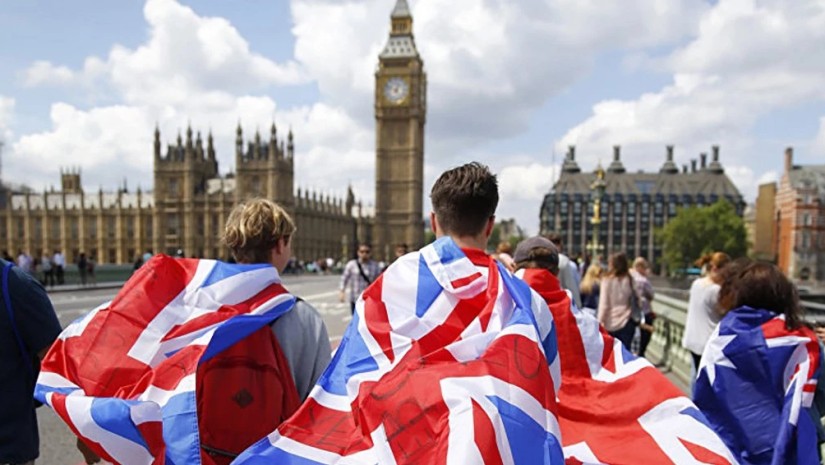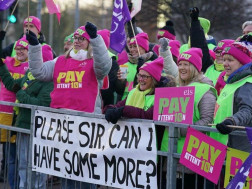Average pay growth in the UK rose above inflation for the first time in almost two years, in a sign that the squeeze on living costs may be starting to ease.
Wages rose at an annual rate of 7.8% between June and August, figures show.
That was higher than average inflation over the same three months, which measures the rate at which prices rise.
Revised figures showed pay overtook inflation in the three months to July, meaning wages are outpacing prices for the first time since October 2021.
However, the rise in wages is an average and does not mean that cost of living pressures are subsiding for everyone.
There continues to be a big gap between public and private sector pay.
Wage growth for public sector workers reached 6.8% between June and August, which the Office for National Statistics (ONS) said was the biggest increase since comparable records began in 2001.
But the average pay rises for private sector employees was 8%.
People employed in finance and business services saw the largest rise in annual pay, followed by those in the manufacturing sector.
The rate of inflation has been slowing but, at 6.7% for the year to August, it remains more than three times higher than the Bank of England's 2% target.
New inflation figures will be released on Wednesday, which are expected to show price rises are continuing to slow.
Chancellor Jeremy Hunt, said: "It's good news that inflation is falling and real wages are growing, so people have more money in their pockets."
The Bank of England has been increasing interest rates in an attempt to curb inflation.
However, it held borrowing costs at 5.25% last month and, following the latest wage growth figures, analysts at Capital Economics believe rates will not rise any further for now.
"Cooling labour market conditions appeared to start feeding through into an easing in wage growth in August," said Ashley Webb, UK economist at the research firm. "That supports our view that interest rates have peaked at 5.25%.
"But as we suspect wage growth will fall only slowly, interest rates will probably stay at their peak until late in 2024."
The number of job vacancies in the UK continued to fall, dropping by 43,000 to 988,000 between July and September.
Real estate companies had the sharpest fall in available jobs compared to other industries, with vacancies plunging by almost 30% compared to the previous three months.
Despite the decline in overall figures, the total number of vacancies remains 187,000 above that seen in January to March 2020 before the Covid pandemic hit the economy.
As inflation eases and employers grapple with the impact of higher interest rates, economists expect wage rises to slow.
More comprehensive unemployment figures next week are expected to add to the picture of a weaker jobs prospects; previous releases have already revealed 200,000 posts lost over the early summer.
And the freezing of personal allowances and tax brackets, at which the basic and higher rates of income tax become payable - a policy dating back to 2021 - are siphoning more money out of pay packets.
By 2028, the Institute for Fiscal Studies is warning this will equate to a tax rise of £50bn.
Moreover, Dr Swati Dhingra, one of the Bank of England's rate-setting committee, warned the BBC last week that the bulk of the impact of interest rates has yet to filter across the economy, via changes in spending and so employment.
It may ultimately be younger and less skilled workers who are worst affected, she said.
'Very difficult'
While some sectors had seen average pay growth rise sharply, others did not fare so well, the ONS said.
Average wage growth for construction workers was the lowest compared to other industries at 5.7% between June and August.
Wages are a concern for Alex Patrick-Smith, the executive chairman of Dudley brick-making firm Ketley Brick.
He told the BBC that after overcoming soaring energy prices, demand has now fallen by 30%.
Meanwhile, Ketley Brick's commitment to paying the living wage, which is set to increase to £11 an hour from next April, has had a knock-on effect for all employees across the company.
"This has unfortunately arrived at a time where it's been very, very difficult for us because demand has fallen and we've got this cost increase that's put upon us," Mr Patrick-Smith said.
But he is reluctant to lay off any of his 64-strong team.
"Without a workforce that is going to be here when we come through the other side, we're not going to be able to produce at the level that we would like to, and so we're doing everything we possibly can to maintain the levels of employment," Mr Patrick-Smith said, BBC reports.























